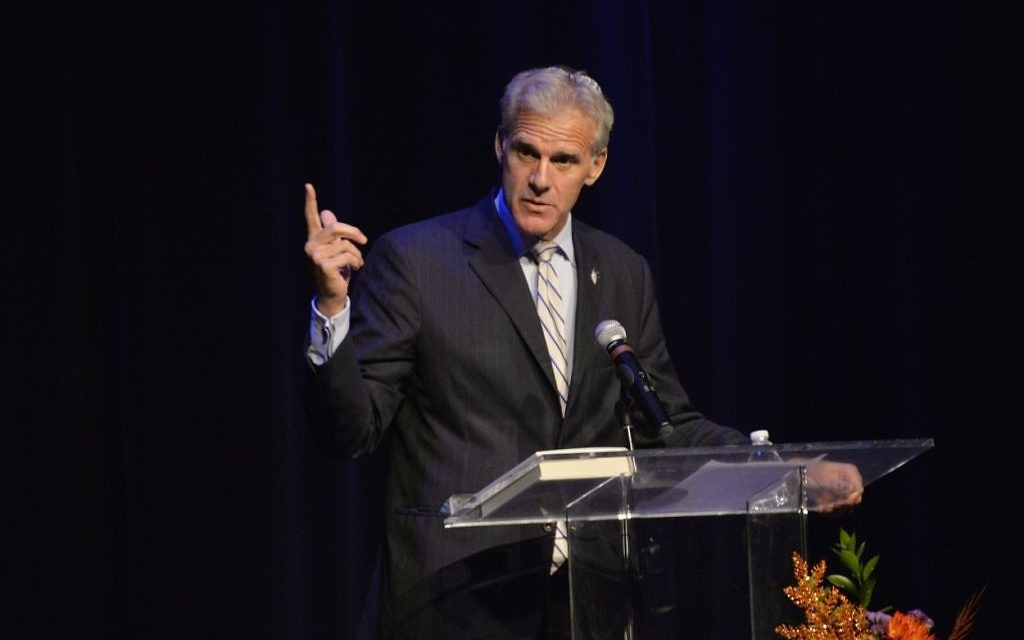Oren: Israel, U.S. Are Allies a World Apart
The United States and Israel have experienced a rough period in relations because of their fundamental differences on Iran, but Knesset member Michael Oren is confident that both countries will continue to rely on each other.
“There is no substitute for the United States for Israel,” said Oren, who held the job he had dreamed of as a teenager growing up in New Jersey when he served as Israel’s ambassador to the United States throughout President Barack Obama’s first term. “There is no substitute for Israel for the United States.”
Oren spoke to a packed Atlanta Jewish Academy auditorium Wednesday, Oct. 7, in the prologue to the Book Festival of the Marcus Jewish Community Center. He explored some of the difficulties between Obama and Israel, just as he does in his latest book, “Ally.”
Get The AJT Newsletter by email and never miss our top stories Free Sign Up
The differences often result from conflicting worldviews, Oren said. He cited the example of Winston Churchill: Obama removed a bust of Britain’s World War II prime minister from his office; Israeli Prime Minister Benjamin Netanyahu hung a picture of Churchill in his office to always be looking over his shoulder.
The president made it clear in May 2009 when he first met with Netanyahu, also newly elected, that the longtime U.S.-Israel “no surprises, no daylight” policy of consulting in advance about policies and actions and not revealing any differences in their positions in public was no longer in effect, Oren said.
Security coordination is stronger than ever under Obama with no daylight between the allies, Oren said, and the president came through for Israel in December 2010 when a forest fire looked unstoppable because Israel has no firefighting planes or fire retardant. When Oren made an emergency request, Obama told his aide to “get Israel whatever it needs,” and eight planes, 11 fire jumpers and all the necessary retardant arrived to put out the fire and save Haifa.
But on policy matters, Obama chose from that first meeting to air demands and differences in public, Oren said. “Daylight is just daylight in the Middle East, and it can be searing.”
The burn grew worse in June 2009 when Obama gave his much- anticipated
speech in Cairo to reach out to the Muslim world. The speech, twice the length of his first inaugural address, made the most public embrace of the Palestinian cause and most public condemnation of Israeli settlements. But more important, Oren said, the speech for the first time recognized the right of Iran — the world’s leading state sponsor of terrorism and a nation whose leaders repeatedly have called for Israel’s destruction — to pursue a peaceful nuclear program and referred to Iran as “the Islamic Republic.”
“We had no warning whatsoever,” Oren said, and Israel never got a heads-up about U.S. policy statements again.
Still, Netanyahu responded in June 2009 by endorsing a two-state peace solution and by setting a 10-month moratorium on settlement construction, both of which were big deals for a Likud leader, Oren said. But policy differences continued and grew worse when the Arab Spring arrived in 2011:
- Israel worried about the Muslim Brotherhood; the United States thought it would mellow in power.
- Israel did not see Turkish President Recep Erdogan as a good guy; the United States considered him a reliable partner against militants.
- Israel urged the United States to intervene in Syria; Obama was determined to avoid new military commitments in the Middle East.
The most important differences, however, involved Iran and its nuclear ambitions.
The Iranian nuclear program, which has legitimacy under the new international deal to produce weapons in 13 to 15 years, presents a triple threat to Israel, Oren said. In addition to the danger from Iran itself, once it has nuclear weapons, its proxy Hezbollah will have them, and all of the other regional powers will obtain them.
“The Iranian nuclear program to us is not about politics. It’s not about Democrat or Republican. It’s about survival,” Oren said, explaining that while the United States is huge and far from Iran, Israel is tiny and close by.
The distance between Iran and Israel is getting smaller, at least in terms of the military, Oren said. The week he spoke, Iran moved 1,500 troops into Syria near Israel’s northern border, which has been peaceful for 42 years. Iran also is providing kits for Hezbollah to convert its 100,000 dumb rockets into smart cruise missiles, impervious to Iron Dome.
“Welcome to the new Middle East,” Oren said. “This is what the Middle East looks like without the United States in it right now.”





comments